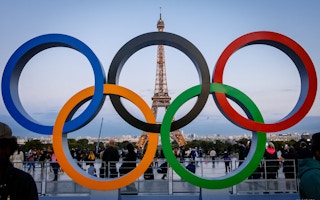Will these measures work?
Climate groups have praised the Paris organisers for trying to hold a greener Games but some environmentalists are sceptical that the ambitious target of halving emissions can be met.
A report from Carbon Market Watch and not-for-profit research group éclaircies, released on April 15, said the organisers’ sustainability plan only covered around 30 per cent of predicted emissions.
While the construction and food sustainability strategies were robust, more should be done to address the impact of international travel, according to Benja Faecks, co-author of the “Going For Green” report.
Asked to comment, a spokesperson for the Paris organisers said that the Carbon Market Watch report was factually inaccurate and didn’t take all the available information into account.
The report said organisers should offer discounted tickets for people travelling by train or include chartered train travel in ticket prices.
The Games’ organisers said they recommended train travel in their communication with ticket holders, and the British, Dutch, and Belgian delegations have all committed to travel to Paris by train.
Official partner Air France has pledged to match contributions to its Sustainable Aviation Fuel scheme made by customers flying to France during the Games.
While commending the organisers’ efforts to avoid greenwashing, the Carbon Market Watch report said they needed to be more transparent about plans to purchase carbon offsets - a controversial practice that allows a nation or company to buy carbon credits to pay for actions to cut emissions elsewhere, like buying and maintaining a forest or planting trees.
The Games’ organisers say they plan to support reforestation, forest preservation and renewable energy development projects.
Climate analysts say carbon offsets are being overused as the primary basis of net-zero claims for sporting events.
What would a Green Olympics look like?
The Olympic Games would need to slash 60 per cent of its emissions by 2036 to align with the ambitions of the Paris Climate Agreement to keep global warming below 1.5°C, according to Carbon Market Watch.
For some environmentalists, the answer lies in downsizing and updating the whole model.
Carbon Market Watch recommended assigning sporting events to different countries and limiting attendance to local spectators.
A similar strategy proposed by advocacy group Earthday.org said the Games should be rotated between a few host cities.
Environmentalists have also called for the creation of an independent body to monitor sustainability standards and have suggested that sports federations that are not carbon zero should be excluded from future Games.
This story was published with permission from Thomson Reuters Foundation, the charitable arm of Thomson Reuters, that covers humanitarian news, climate change, resilience, women’s rights, trafficking and property rights. Visit https://www.context.news/.








